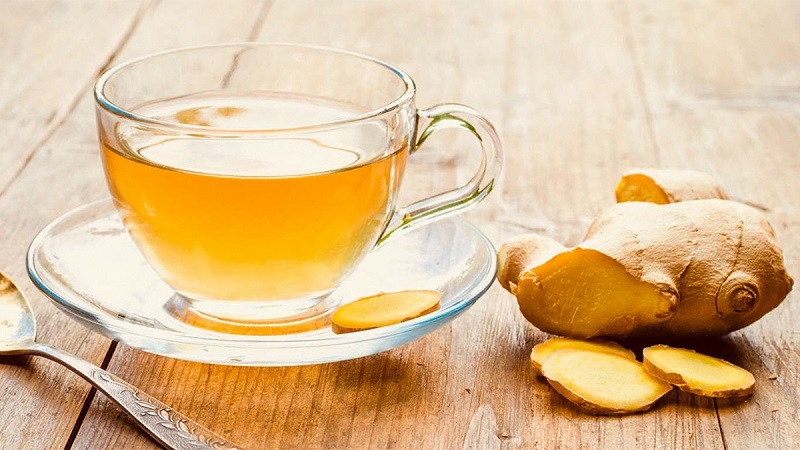Ginger tea is a healthy drink that is popular with many people, especially on cold days. However, there are some things to keep in mind when drinking ginger tea.
1. Nutritional information of ginger tea
According to the United States Department of Agriculture, 1 cup of plain ginger tea contains:
- Calories: 2
- Carbohydrates: < 1 g
- Total sugars: 0 g
- Dietary fiber: 0 g
- Total fat: 0 g
- Saturated fat: 0 g
- Sodium: 10 mg
- Calcium: 7 mg
- Potassium: 10 mg
Ginger tea also contains small amounts of vitamins and minerals, but not significant amounts. However, research has shown that ginger tea is rich in bioactive compounds called gingerols and shogaols, which have many health benefits.

Ginger tea is a drink with many health benefits.
2. Some Key Health Benefits of Ginger Tea
Helps Relieve Digestive Discomfort
Ginger tea is perhaps best known for its ability to soothe digestive issues, especially nausea. Several studies have shown that ginger is as effective at relieving nausea and vomiting during pregnancy as common anti-nausea medications because ginger contains a powerful compound called gingerol, which helps reduce nausea by blocking certain receptors in the gut.
Sipping on ginger tea can soothe the queasy feeling in the stomach associated with nausea and vomiting. More specifically, “ginger has been shown to reduce nausea during pregnancy, after surgery or chemotherapy, and motion sickness,” says Elena Ivanina, board-certified integrative gastroenterologist and founder of Gut Love and the Center for Integrative Gut Health.
Anti-inflammatory
Ginger contains important phytonutrients called gingerols which have antibacterial and anti-inflammatory properties, and when taken as a tea, can help support a healthy gut microbiome.
Ongoing inflammation is a major contributor to the development and progression of many chronic diseases. Various compounds in ginger, such as shogaol, zingerone, have been studied and found to have anti-inflammatory properties in autoimmune diseases such as rheumatoid arthritis, inflammatory bowel disease, and psoriasis. Ginger may provide anti-inflammatory benefits by reducing the production and release of inflammatory molecules, such as prostaglandin E2 and inflammatory cytokines. Therefore, ginger contributes to reducing disease-related inflammatory markers
Helps Lower Blood Pressure
A 2017 study found that people who consumed ginger daily had a lower risk of developing high blood pressure. Although the study did not look specifically at ginger tea, consuming ginger tea may be beneficial for people with high blood pressure.
May aid weight loss
There has been some research into the benefits of ginger when it comes to weight and obesity. A review of this research highlights that ginger may have a positive effect on obesity through a number of different mechanisms, including appetite control and increased thermogenesis (heat production).
Headache and Migraine Relief
There has been quite a bit of research on ginger and its pain-relieving properties, which can help prevent and relieve headaches.
Regular consumption of ginger tea can also help relieve pain. In fact, ginger has been shown to be effective in relieving pain from menstrual cramps, especially when taken in the first few days of your period. Additionally, ginger can also help relieve pain associated with muscle aches, migraines, knee osteoarthritis, and chronic lower back pain. These pain-relieving effects are partly due to ginger’s powerful anti-inflammatory and antioxidant properties.
Rich in Antioxidants with Antibacterial Effects
Ginger is high in antioxidants and has been shown to have anti-tumor cell proliferation effects.
One study highlighted that ginger can help reduce the growth and biofilm formation of bacteria, such as Pseudomonas aeruginosa, Streptococcus mutans, and Staphylococcus aureus. Ginger also has antibacterial effects against E. coli, Salmonella typhi, Candida albicans, and Mycobacterium tuberculosis.
However, more research is needed to confirm these effects. Therefore, you should always consult your doctor for proper diagnosis and treatment of potential infections.
May Help Regulate Blood Sugar
Emerging research suggests that ginger may help improve blood sugar control. According to one review, ginger helped lower fasting blood sugar and hemoglobin A1C (a measure of blood sugar over a three-month period) in people with type 2 diabetes. Although the exact mechanisms are not yet fully understood, experts believe that compounds in ginger promote glucose clearance in peripheral tissues, which is important for maintaining blood sugar balance and improving diabetes control. Simply put, ginger may help move glucose from the bloodstream into cells, thereby reducing blood sugar levels.

Ginger contains antioxidants that help reduce inflammation.
3. Is ginger tea suitable for everyone?
Some people may experience side effects from drinking ginger tea, such as bloating or heartburn, and due to its potential blood pressure lowering effects, people with low blood pressure or taking any blood pressure medication should drink it in moderation.
Ginger should be used with caution if you are taking certain medications. For example, ginger has antiplatelet effects, which can increase the risk of bleeding when taken with anticoagulants or antiplatelet drugs, such as warfarin. Additionally, because ginger can lower blood sugar levels, taking ginger with diabetes medications increases the risk of hypoglycemia (or low blood sugar).
Ginger may also increase the risk of hypotension or low blood pressure when taken with calcium channel blockers, as they are thought to have the same mechanism of action, so it is advisable to talk to your doctor before adding ginger tea to your daily routine, especially if you are taking any of these medications or are pregnant/breastfeeding.
If ginger tea does not cause negative side effects and does not interact with any other medications, supplements, and/or medical conditions, then you can enjoy ginger tea every day.

People with poor health should consult a doctor if they want to drink ginger tea regularly.
4. Notes on drinking ginger tea every day
Ginger tea can be drunk at any time of the day. It works well as a refreshing drink in the morning, and many people also find it helps with digestion after meals. Drinking ginger tea after dinner or before bed helps aid digestion and bowel movements. Additionally, ginger tea is a great caffeine-free option to drink before bed, especially if you have muscle aches, as its anti-inflammatory properties can help soothe these aches and promote better sleep at night.
You can add fresh lemon or honey, or buy flavored tea bags, such as lemon ginger tea or green ginger tea.
Drinking a cup of ginger tea every day is unlikely to pose serious risks for most people. The US Food and Drug Administration considers ginger safe in doses up to 4 grams. Typically, common ginger tea recipes contain about 1 to 1.5 grams per tea bag. However, if ginger is consumed in large amounts, it can cause some side effects, including mild heartburn, diarrhea, and mouth irritation.
Drinking ginger tea regularly can improve your health, but you should always talk to your doctor before adding ginger tea to your diet, especially if you have a medical condition or are taking medication.





